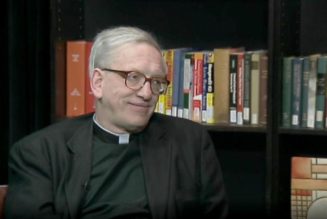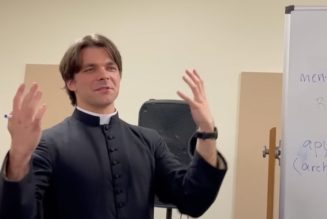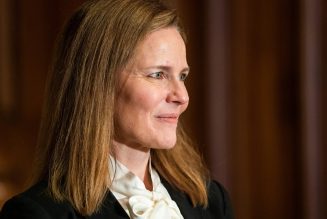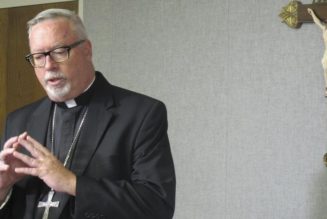We in the West live in a place and at a time in which almost every burden of manual labor has been eliminated. Not only that, but creature comforts abound. Everything from air conditioning to hair conditioning, from fast food to high speed internet, from to indoor plumbing to outdoor grilling, from instant computer downloads to instant coffee machines. You don’t even have write letters anymore, just press send and a text or email is delivered nearly instantaneously. Yet despite all this it would seem that we still keenly experience life’s burdens, demonstrated by the widespread recourse to psychotherapy and psychotropic drugs.
It is increasingly clear that serenity is “an inside job.” Merely improving the outside and amassing creature comforts is not enough. A large fluffy pillow may cushion the body, but apparently not the soul.
Jesus wants us to work on the inside and presents us a teaching in today’s Gospel on being increasingly freed of our burdens. He doesn’t promise a trouble free life, but that if we will let Him go to work we can grow in freedom and serenity. Jesus gives a threefold teaching on how to do this: by filiation, imitation, and simplification.
I. Filiation – At that time Jesus exclaimed, “I give praise to you, Father, Lord of heaven and earth, for although you have hidden these things from the wise and the learned you have revealed them to little ones. Yes, Father, such has been your gracious will. All things have been handed over to me by my Father. No one knows the Son except the Father, and no one knows the Father except the Son and anyone to whom the Son wishes to reveal him.”
Note how Jesus contrasts the “wise and learned” from the “little ones.” In so doing, Jesus commends to us a childlike simplicity before our heavenly Father, our Abba, our “Daddy-God.” This is the experience of divine filiation, of being a child of God, of being one of God’s “little ones.” The wise, learned, and clever often miss what God is trying to do and say, and because of this, they feel anxious and stressed.
It is possible for a person to study a great deal, but if he doesn’t pray he isn’t going to get very far. The Greek word translated here as “revealed” is ἀπεκάλυψας (apekalupsas), which more literally means “to unveil.” Only God can take away the veil and He does so for the humble and simple. Thus Jesus commends to our understanding the need for childlike simplicity and prayerful humility.
Half of our problem in life, and the overwhelming cause of our stress, is that we think too much and pray too little. We have big brains but small hearts, and so we struggle to understand God instead of just trusting Him. Though our reason is our crowning glory, we must never forget how to be little children in the presence of God our Father. No matter how much we think we know, it isn’t really very much. Jesus’ first teaching is filiation, of embracing a childlike simplicity before our Daddy-God.
What does it mean to be childlike? Consider how little children are humble. They are always asking “Why?” and are unashamed to admit that they do not know. Children are also filled with wonder and awe; they are fascinated by the littlest and biggest of things. They know they depend on their parents and run to them instinctively when they’ve been hurt or at any sign of trouble. They trust their parents completely. Children are always asking, seeking, and knocking.
Thus Jesus teaches us that the first step to lessening our burdens is to have a childlike simplicity with the Father, wherein we are humble before him, acknowledging our need for Him and complete dependence upon Him. He teaches us to have a simplicity that is humble enough to admit that we don’t know much and want to learn from Him, a wonder and awe at all that God has done, and an instinct to run to God when we are hurt or in trouble. Above all, Jesus teaches us by this image to grow each day in our trust of Abba, and in our confidence to ask Him for everything we need. Scripture says, You have not because you ask not (James 4:2). An old spiritual says, “I love the Lord; he heard my cry; and pitied every groan. Long as I live and troubles rise; I’ll hasten to his throne.”
Yes, run, with childlike simplicity and trust.
So here is the first teaching of Jesus on letting go of our burdens: grow in childlike simplicity and trust before God, your loving Father and Abba.
II. Imitation – “Come to me, all you who labor and are burdened, and I will give you rest … for I am meek and humble of heart; and you will find rest for yourselves.” Jesus commends to us two characteristics of Himself that (if we embrace them) will give us rest and relief from our burdens. He says that He is meek and humble of heart.
What does it mean to be meek? The Greek word used is πραΰς (praus), but there is some debate as to how it is best interpreted. Aristotle defined “praotes” (meekness) as the middle ground between too much anger and not enough. Hence, the meek are those who have authority over their anger.
However, many biblical scholars contend that Jesus used this word most often as a synonym for being “poor in spirit.” What does it mean to be poor in spirit? It means to be humble and dependent upon God. By extension, it means that our treasure is not here. We are poor to this world; our treasure is with God and the things waiting for us in Heaven. This is a source of serenity for us, for when we become poor to this world, when we become less obsessed with success, power, and possessions, many of our anxieties go away. To the poor in spirit, the wealth of this world is as nothing. You can’t steal from a man who has nothing. A poor man is less anxious because he has less to lose, less at stake. He is free from this world’s obsessions and the fears and burdens they generate. Jesus calls us to accept his example and to grow in our experience of being poor in spirit.
Jesus also says that He is humble of heart. The Greek word use is ταπεινός (tapeinos), meaning lowly or humble, and referring to one who depends upon the Lord rather than himself. We have already discussed this at length above, but simply note here that the Lord Jesus is inviting us to learn this from Him and to receive it as a gift. The Lord can do this for us. If we will learn it from Him and receive it, so many of our burdens and so much of our anxiety will be lifted.
Here, then, is the second teaching Jesus offers us so that we will see life’s burdens lessened. He teaches us to learn from Him and to receive from Him the gifts of being poor in spirit and humble of heart. The serenity that comes from embracing these grows with each day, for we are no longer bound by the shackles of this world. It cannot intimidate us because its wealth and power do not entice us; we do not fear their loss. We learn to trust that God will see us through and provide us with what we need.
III. Simplification – Take my yoke upon you … For my yoke is easy, and my burden light. The most important word in this sentence is this one: “my.” Jesus says, my yoke is easy, and my burden is light.
 What is a yoke? Essentially “yoke” is used here as a symbol for the cross. A yoke is a wooden truss that makes it easier to carry a heavy load by distributing the weight along a wider part of the body, or by allowing the weight to be shared by two or more people or animals. In the picture at left, the woman is able to carry the water more easily with the weight across her shoulders rather than in the narrow section of her hands. This eases the load by involving the whole body more evenly. Yokes are also used to join two animals and help them work together in pulling a load.
What is a yoke? Essentially “yoke” is used here as a symbol for the cross. A yoke is a wooden truss that makes it easier to carry a heavy load by distributing the weight along a wider part of the body, or by allowing the weight to be shared by two or more people or animals. In the picture at left, the woman is able to carry the water more easily with the weight across her shoulders rather than in the narrow section of her hands. This eases the load by involving the whole body more evenly. Yokes are also used to join two animals and help them work together in pulling a load.
What is Jesus saying? First, He is saying that He has a yoke for us, that is, He has a cross for us. He is not saying that there is no burden in following Him. There is a cross that He allows, for a reason and for a season.
Easy? Jesus says that the cross He has for us is “easy.” The Greek word χρηστὸς (chrestos) is better translated as “well-fitting,” “suitable,” or even “useful.” The Lord is saying that the yoke He has for us is suited to us; it is well-fitting; it has been carefully chosen so as to be useful for us. God knows that we need some crosses in order to grow and He knows what they are. He also knows what we can bear and what we are ready for. Yes, His yoke for us is well-fitting.
Note again that little word: “my.” The cross or yoke Jesus has for us is well-suited and useful for us. The problem comes when we start adding things of our own doing to the weight. We put weight upon our shoulders that God never put there and did not intend for us. We make decisions without asking God. We undertake projects, launch careers, accept promotions, and even enter marriages without ever discerning if God wants this for us. Sure enough, before long our life is complicated and burdensome; we feel pulled in many different directions. But this is not the “my yoke” to which Jesus referred; this is largely the yoke of our own making. Of course it is not easy or well-fitting; Jesus didn’t make it.
Don’t blame God, simplify. Be very careful before accepting commitments and making big decisions. Ask God. It may be a good thing, but not good for you. It may help others, but destroy you. Seek the Lord’s will. Ask advice from a spiritually mature person if necessary. Consider your state in life; consider the tradeoffs. Balance the call to be generous with the call to proper stewardship of your time, talent, and treasure. Have proper priorities. It is amazing how many people put their career before their vocation. They accept promotions and special assignments, thinking more about money and advancement than their spouse and children. Sure enough, the burdens increase and the load gets heavy. This is what happens when we don’t ask God or even consider how a proposed course of action might affect the most precious and important things in our lives.
So stop “yoking around.” Jesus’ final advice to us is to “take my yoke,” but only that. Forsake all others. Simplify. Take only His yoke. If you do that, your burdens will be lighter. Jesus tells us to come and learn from Him. He will not put heavy burdens on us. He will set our heart on fire with love. And then, whatever yoke He does have for us will be a pleasure for us to bear. What makes the difference is love. Love lightens every load.








